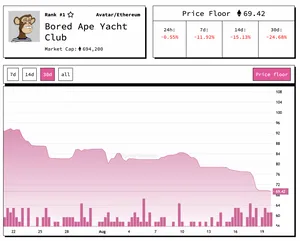Describing the layoffs, a spokesperson for 2TM said that Mercado was suffering for playing by the rules. "The competitive environment remains deteriorated and unfair, lacking the approval of the legal framework for crypto-activities, as players following the law are penalized by companies that ignore local rules."
Holding company for Mercado cuts 15% of employees
dYdX infuriates users by requesting "liveness checks" via webcam, cancels campaign due to "overwhelming demand"
This infuriated many crypto users, who were horrified that dYdX would try to collect this kind of biometric data. "DYDX just nuked itself. I would never use this platform," wrote a prominent trader.
On September 1, dYdX tweeted that "Due to extremely overwhelming demand of the $25 deposit bonus promotion, we are ending the campaign, effective immediately. Thank you to the many thousands of new users that onboarded to dYdX today. We truly underestimated the amount of interest the campaign garnered." They made no mention of the backlash against the liveness checks, but quietly removed the mentions of the system from their website.
Bill Murray's NFT charity auction nets $185,000, which is then immediately stolen
However, hours after the auction, a hacker gained access to Murray's crypto wallet and snagged the ETH for themselves. They also attempted to steal 800 NFTs from the remaining collection by Bill Murray, though a wallet security team was able to safeguard those NFTs in time.
Murray's team confirmed the theft, and said they are working with the police and Chainalysis to identify the hacker.
Attackers steal around $265,000 of user funds from KyberSwap exchange
Kyber identified and remedied the issue after two hours of investigating it, and only two wallets were affected. Kyber promised to compensate the users who lost funds, and also tried to tempt the hacker into returning funds by allowing them to keep 15% of the stolen money as a "bounty" (~$40,000).
Snapchat abandons its web3 plans
This news came amidst the announcement that Snap would be laying off 20% of its staff, a whopping 1,300 people.
- "Snap to 'sunset' web3 team in company restructuring", The Block
- "Snap explores plans to let users showcase NFTs as filters", Financial Times
Unable to recover from the April Rari exploit, Babylon Finance shuts down
Since April, Babylon tried to recover from the hack. However, they described it as "the domino that kickstarted a series of unfortunate events". Rari canceled their planned reimbursement, users withdrew their funds from Babylon Finance, the Fuse pool on Rari was abandoned, and the token price decreased from around $20 to around $5.
On August 31, Babylon Finance's founder Ramon Recuero published a blog post announcing that Babylon would be shutting down. They promised to distribute the remaining project treasury among holders. Users were told to withdraw their funds by November 15.
- "Babylon Finance is shutting down", Ramon Receuro
Lawyer Kyle Roche withdraws from several crypto class-action lawsuits after allegations that he was involved in "gangster-style" schemes to hurt competitor projects
Although Roche has denied the claims by the site, and stated that someone deliberately got him drunk and then took clips of videos out of context, it probably doesn't look so good for a lawyer to be referring to jurors as "10 idiots", or plaintiffs in class-action lawsuits as "100,000 idiots".
Helium ditches its blockchain
Now, Helium is ditching its custom Helium chain in favor of a Solana-based token, and scrapping the blockchain entirely for the portions of its service that actually used the blockchain for anything beyond handling rewards.
Helium seems to have realized, finally, that blockchains tend to be slow as hell. In a blog post about the change, they wrote that "specific transactions, including Proof-of-Coverage and Data Transfer Accounting, are processed on-chain unnecessarily. This data bottleneck can cause efficiency issues such as device join delays and problems with data packet communications, which bloats the Network and causes slow processing times." They outline their plans to move these portions of the project to a "more traditional large data pipeline" — that is, infrastructure that's actually well-suited to that kind of processing.
- "HIP 70: Helium Core Team Proposes to Migrate to Solana", Helium Foundation
- Helium Tracker
DC Attorney General sues Michael Saylor and MicroStrategy for tax evasion
DC permits the court to impose "treble damages" on Saylor if he is determined to have evaded the taxes he owes, which could end up costing him and MicroStrategy more than $100 million in taxes and penalties.
- "AG Racine Sues DC-Based Billionaire Michael Saylor & Software Company Microstrategy for Evading More Than $25 Million in District Taxes", Office of the Attorney General for the District of Columbia
Compound Finance breaks their cETH market for a week
Thodex CEO arrested over a year after fleeing Turkey in the wake of the exchange's collapse
His plan to somehow work off anywhere from $24 million to $2.5 billion in debts was stymied when he was apprehended by Albanian authorities. He faces extradition to Turkey, where a prosecutor has asked for sentences of 40,564 years for him and other executives (just in case, I guess).
Thai SEC punishes Bitkub CTO for trading Bitkub Coin on insider information
The SEC reported that Wajanasathian had purchased around $61,000 of Bitkub Coin ($KUB) just before it was publicized that the Siam Commercial Bank would purchase a 51% stake in Bitkub. After the announcement, the value of KUB rose 100%.
Earlier that week, the SCM had announced they would not be following through on purchasing the planned $500 million stake in Bitkub, due to concerns over "various issues" that were raised by the Thai SEC.
Crypto.com wants back the $7.2 million they accidentally sent a customer last year
Rather than contacting Crypto.com about the error, she put the money into a joint account shared with her sister, and purchased her sister a five-bedroom home with nearly US$1 million of the funds.
Crypto.com only discovered the error in a December 2021 audit, and sued the woman for the erroneously-sent funds. She's just been ordered by the Victoria Supreme Court to sell the home and return the remaining money.
Unlike with many crypto transactions, erroneous transactions on centralized exchanges can typically be reversed by the exchange. However, Crypto.com would have had to notice the error much sooner, before the recipient transferred the funds elsewhere.
Hacktivists make NFTs out of the stolen passports of Belarusian officials
The group is selling the NFTs for between 0.2 and 6.5 ETH ($300–$9,700), and say that all proceeds will go towards "our work in hitting bloody regimes in minsk & moscow".
OpenSea took down the NFT collection shortly after it was published.
OptiFi developer accidentally closes the project contract, irretrievably locking $661,000
OptiFi has promised to return user deposits and settle all positions. In a post-mortem, they wrote that they had learned that "Every deployment needs a rigorous process and single point failure can be avoided. Please don't rush like what we did, especially for defi projects". They further outlined a "peer-surveillance approach" in which three people would be required to deploy any changes together. They also asked the Solana team to implement a two-step confirmation for such a potentially destructive command.
Whistleblower website alleges that the creators of the Avalanche blockchain paid lawyers to attack competitors
"A pact was formed that involved Ava Labs granting Roche Freedman a massive quantity of Ava Labs stock and Avalanche cryptocurrency (AVAX), now worth hundreds of millions of dollars, in exchange for Roche Freedman agreeing to pursue a hidden purpose," the site claims.
The site does include video clips of Roche saying some surprising things, although the clips are very short and devoid of context. The whole thing should be taken with a grain of salt.
Ava Labs founder Emin Gün Sirer dismissed the claims on the site as "conspiracy theory nonsense". Roche published a statement about the " numerous unsourced false statements and illegally obtained, highly edited video clips that are not presented with accurate context", in which he said that his statements about filing class action suits at the behest of Ava Labs were "false, and were obtained through deceptive means, including a deliberate scheme to intoxicate, and then exploit me, using leading questions. The statements are highly edited and spliced out of context."
CEO of Ragnarok metaverse game admits to treasury mismanagement, including nearly $2 million in trading losses and exorbitant salaries
On August 26, CEO Fanfaron published a Substack post providing a breakdown of the project's finances, which he began by saying, "As a previous business owner, and because Ragnarok is a startup and not a DAO, our initial plan was never to operate our finances in public, which is why we have historically been closed and unwilling to share full accounting of our balance sheet." As the post went on, it became clear there might be other reasons they were reticent to publish it.
The post revealed that Fanfaron had lost $1.827 million buying ETH during the crypto downturn: "I made mistakes by buying ETH multiple times when I thought it was an advantageous investment for the project, but then to protect downside risk and with the plan to reinvest at a better time, I sold our position in ETH, multiple times.."
It also revealed that the project is paying its team members apparently enormous salaries: $5.4 million in team compensation, plus another $1.5 million spent to buy out a co-founder. "We're a scrappy startup," he wrote, after also acknowledging that he pays himself $50,000 a month ($600,000 a year) — a number he already reduced by $600,000 from his original salary of $1.2 million per year. He ultimately promised in the post to pay back his trading losses.
As for the game, well, it exists, which means it's already ahead of a lot of crypto games. They launched an alpha version of the game in late July after multiple delays, with Fanfaron explaining, "Our vision was to create something similar to WoW... we were, however, overeager and optimistic with regards to how much time it takes to create such a world." The alpha is a multiplayer pixel art world where characters can walk around and talk to each other, and interact with buildings. Battling, leveling, quests, missions, and breeding are apparently all yet to come.
- "From Fanfaron"
- "Ragnarok: The MetaRPG", This Week in Avalanche
Indian financial crimes authority searches the offices of CoinSwitch, the country's largest crypto company
According to the CEO, there's nothing to worry about, the search had nothing to do with money laundering (that's specific), and the agency only executed the search to learn more about its business model and user onboarding. Seems like a pretty weird way to do that, but what do I know.
TechCrunch, however, reported that four people familiar with the investigation stated the investigation was to do with potential violations of foreign exchange laws, and that the agency suspects CoinSwitch acquired $200 million in shares in violation of forex laws.
eth.link service about to go offline because domain owner is in prison
.eth, that's an ENS address. The problem is that .eth is not a functional top-level domain, and so many services relied on eth.link to surface these DNS records to other services.However, the eth.link domain is only rented for a set period of time and needs to be renewed. ENS DAO tweeted that the domain's owner, Virgil Griffith, is "unavailable". By this, they mean that he is currently serving his first of five years in prison for helping North Korea evade sanctions. With Griffith "unavailable", the project has found itself at the mercy of GoDaddy. Welcome to the decentralized web3 we've all been promised!
Although GoDaddy previously allowed another person to renew the domain on Griffith's behalf, they reversed that decision, and now say they intend to allow the domain to expire on September 5.
The ENS DAO issued a series of tweets urging people to switch to a different service, given the risk that the domain could be snapped up. "If the name expires and is acquired by someone with ill intent, the damage they could do via phishing is substantial - so please update your links and alert your users of the issue immediately," they wrote.
The latest Pokémon-themed rug pull nets $708,000
One might think the blatant rip-off of the Pokémon IP (which belongs to a notoriously litigious company) might have been a red flag, but nevertheless, people bought in to PokémonFi — a play-to-earn game that seems like a much worse version of the original thing.
The project and tokens first launched in April. After apparently running off with the money, the project deleted its Twitter account, though its website remained live.
Researcher zachxbt alleges that teenager who stole crypto worth $37 million in 2020 is responsible for a spate of crypto-related Twitter hacks
Now, crypto investigator zachxbt thinks the same individual is indirectly responsible for a slew of compromised Twitter accounts that have then been used to promote crypto scams, including those of Beeple, DeeKay, and others. According to zachxbt, he has been selling access to a Twitter admin panel, which allows employee-level access to Twitter tools. This might explain how many of the accounts were compromised despite being protected by multi-factor authentication. According to zachxbt, "It's still unclear as to how Redman gained access to the panel to make elevated requests & reset passwords. As of now it appears the method stopped working".
10% of Ethereum nodes at risk of being booted from cloud hosting provider
16% of all hosting nodes (a category that makes up 62% of all nodes by network type) are hosted with Hetzner — 10% of all nodes. If 10% of all Ethereum nodes being supported by one company sounds awfully centralized to you, wait til you hear that 30% run on Amazon services.
SudoRare NFT exchange rug pulls for $820,000
At least one of the scammer wallets interacted with the Kraken crypto exchange, a U.S.-based exchange that requires KYC, so it's possible that Kraken could help identify the scammers — though they've not made any public moves to do so.
- "NFT Exchange SudoRare Goes Dark After $820,000 Rug Pull", CryptoBriefing
- "SudoRare Pulled the Rug for $820,000. How Will Kraken Respond?", CryptoBriefing
Group charged for stealing over $4 million in transaction reversal scheme
The three men were charged with wire fraud, bank fraud, and identity theft charges, and face potential decades in prison if convicted.
- "Three Members Of Miami Crew Charged With Defrauding Banks And Cryptocurrency Exchange Of More Than $4 Million", U.S. Attorney's Office of the Southern District of New York
Bank run leaves BendDAO with 5 ETH and a bunch of NFTs they can't sell
BendDAO allows people to take out loans with their NFTs as collateral. However, if the floor price of those NFTs drops too far and the borrower doesn't pay back some of the loan to adjust its risk rating, other people can bid on the NFT.
The problem with this whole plan was revealed when lenders' confidence was shaken when it was reported that $5.3 million in Bored Apes were at risk of liquidation. Panicked users withdrew their assets from the platform, resulting in a bank run that drained the reserves to a low of 5 ETH (~$8,200). BendDAO had other assets, of course: the NFTs below the liquidation threshold. However, a lack of interested buyers willing to pay the minimum prices (95% of the collection floor price) left the project in a tough spot.
Since the extremely close brush with a liquidity crisis, the project has begun to consider a proposal that would reduce the threshold at which NFTs can be liquidated, reduce auction and liquidation protection periods, remove the 95% floor price bid requirement, and increase interest rates.
OpenSea's stale listing issue burns another collector
In this case, a person successfully sold their Pudgy Penguin NFT for 8.69 ETH a year ago ($27,500 at the time of sale). Those particular NFTs have been having a comeback lately, and so the collector bought the same NFT back — this time for 20 ETH ($31,500 at the time of sale). However, an old listing from their previous ownership was still active, and someone was able to snap up the NFT from them for only 9.89 ETH ($15,600) within minutes.
The collector's near-instantaneous $20,000 loss has a happy ending for them, though — the person who bought the NFT was willing to reverse the trade.
Someone buys a Bored Ape, gets scammed out of it two hours later
Hodlnaut seems to have lied about their Terra exposure
However, documents from the legal proceedings surrounding the now-underwater firm revealed that Hodlnaut had 317 million UST, which it liquidated at a loss when the previously dollar-pegged UST hit $0.85. In the filing, they wrote, "Due to the market's lack of liquidity, the average exit price of UST to USDC was around 42 cents on the dollar, resulting in realized losses to Hodlnaut Trading Ltd of about USD 189.7M. As a result, Hodlnaut's total debt to depositors of USD 500M became backed by realisable assets of around USD 315M as of 13 May 2022 due to the de-pegging event."
- "Hodlnaut Cuts Staff as Terra Exposure Is Revealed", Crypto Briefing
- Tweet by FatMan
Swyftx crypto exchange cuts 21% of staff
Swyftx had announced in June that it would be merging with trading platform Superhero in a $1.5 billion deal.
Sub-primate lending: $5.3 million in Bored Apes used as loan collateral are at risk of being liquidated
However, NFTs in general haven't been doing so hot lately, and the Bored Apes haven't been immune from the slump. As the Bored Apes collection floor price has decreased, more than 15% of the apes used as collateral for BendDAO loans are in the "danger zone" — close to being auctioned off. These 45 apes are valued at roughly $5.3 million. Liquidation could lead to cascading liquidations, as the auctions could themselves cause the floor price to decrease.
As Bennett Tomlin put it, "I hate that y'all somehow created a risk for cascading liquidations of JPEG backed loans".
The FDIC sends cease and desist letters to FTX US and other entities who claim their products are insured
In July, the FDIC and Federal Reserve sent a cease and desist to Voyager, a company currently undergoing bankruptcy proceedings, which drew in customers with false promises that USD entrusted to the company were safe from any potential Voyager collapse thanks to FDIC insurance.
After choosing to keep the crypto, divorcee wants a do-over
As expected, the lawyer consulted by the FT informed them that their chances of a do-over were pretty slim, and suggested that individuals negotiating a split with a partner don't take on all the high-risk assets like this person did.
As of August 20, Bitcoin was trading at around $21,200–70% lower than at its all-time-high of $69,000 in November 2021. Other major cryptocurrencies are faring similarly poorly, with ETH down 67% to $1,630 from its all-time-high of $4,890.
- "Can I cut my potential tax bills when returning to UK?", Financial Times
DegenTown NFT project rug pulls after promotion from Magic Eden
DegenTown first suffered issues in July, when the project's Twitter account was allegedly hacked, and users were tricked into approving a contract that drained their wallets. One individual behind the project promised they would compensate the users whose wallets were drained, but never did.
The project ultimately rug pulled instead, with Magic Eden acknowledging it in a blog post and Twitter thread on August 17. They wrote that they were "urging the original Degen Town founders to return the funds" — however, this is complicated somewhat by the fact that the identity of one of them is not known to Magic Eden. They explained, "Our prior policy was that we doxxed founders. NFTRamo claimed to be an advisor but we learned that he was actually the founder of the project and used being an advisor as a way of skirting our doxxing processes." This is not the first time their identity verification process was sidestepped — they introduced it after a serial rugpuller used their platform to anonymously sell and then rug pull another NFT project, but that same person was able to do it again only a few months later.
The DegenTown project minted 8,000 NFTs for 3 SOL apiece, bringing in $923,000. Beyond that, the creators took 7.5% in royalties on secondary sales. Magic Eden has said that they were able to get one of the two founders to return the funds they'd earned from the mint, and that they planned to use them to compensate buyers.
- "Magic Eden Response to Degen Town", Magic Eden blog
- Twitter thread by Magic Eden
Bribe Protocol team disappears after raising $5.5 million
Bribe Protocol was incubated by Advanced Blockchain AG and Composable. Composable might ring a bell, because in February its pseudonymous head of product, 0xbrainjar, was revealed to be Omar Zaki, who had settled with the SEC over charges that he had misled investors while operating an unregistered investment advisement company and hedge fund. At the time, he wrote that "I do not want a mistake in my youth to cloud all of the team's efforts", though the SEC charge was filed less than three years prior, when Zaki was 21.
An employee of Figment Capital, one of the investors in Bribe Protocol, claimed that the project had formally shut down and returned 86% of the funds raised from institutional investors, though "retail took a huge L". However, this doesn't appear to have been publicly announced by the project.
Bribe Protocol is, of course, not to be confused with the other Bribe Protocol, a defi project that was abandoned in May 2021.
Experienced crypto trader suffers $470,000 theft after signing malicious message
Crypto.com reportedly lays off hundreds more employees than they announced, tries to hide it
Marszalek also tried to discourage employees from leaking about the layoffs, saying at a company town hall: "A number [of employees laid off] makes for a great headline, it's a great thing to gossip about. [But] as co-owners of this company, you should ask yourself, 'is it in my interest for this number to be out there?'" One employee told The Verge that this did nothing to assuage their fears about the layoffs, and that "[it felt like] I got told to shut up and get back to work. It felt insulting."
One recent review on Glassdoor claims that Crypto.com had laid off "more than 1,000 employees", and alleged that "They've removed the company directory so we can't see the numbers go down."
South Korea moves to block sixteen unregistered crypto exchanges
Although the FSC informed the exchanges they needed to register and report their activities, the exchanges did not comply. The FSC has moved to block access to these exchanges in the country, including by asking communications authorities to block access to the exchanges' websites. The FSC pointed to the risk of user data leaks and money laundering as motivations for their action.
Those operating unregistered exchanges in the country could face up to five years imprisonment or a ₩50 million ($37,900) fine, and be barred from registering in the country for five years.
Binance exec claims that scammers are using deepfakes to impersonate him
The only evidence Hillman provided was a redacted conversation via LinkedIn, where he denies meeting with someone, and they reply: "they impersonated your hologram. This person sent me a zoom link then your hologram was in the zoom". (Again, hologram?) Amusingly, Hillman waxes poetic about the importance of security at Binance throughout the whole post, while also including a LinkedIn screenshot with a name that's blurred so poorly it remains completely legible.
Hillman goes on to claim, with no further evidence, that "a sophisticated hacking team used previous news interviews and TV appearances over the years to create a 'deep fake' of me". If so, this would be remarkable, as to date video deepfakes have mostly been limited to robotic-sounding and grainy pre-recorded Elon Musk impersonations, rather than anything that can respond naturally and quickly to alive conversation.
Another possible explanation is that Hillman is trying to cover Binance's collective ass after being caught taking listing fees for tokens they never list. But who's to say, really — maybe deepfakers have made a considerable breakthrough with startling implications, and Hillman just didn't feel it was important to elaborate on.
- "Scammers Created an AI Hologram of Me to Scam Unsuspecting Projects", Binance
- "Binance executive claims scammers made a deepfake of him", The Verge
- "News: $3b Bitcoin scam, BitConnect, Tezos ruling, bad ICO news, BitFi, Augur, Voatz", David Gerard
- "Update: Binance charged Blockstack $250,000 prior to listing Stacks, but both say it's not a listing fee", The Block
Adam Neumann continues to fail upwards as VCs throw even more money at the ex-WeWork CEO
But Neumann has so far enjoyed a comeback thanks to the likes of Andreessen Horowitz, who led a $70 million funding round in May for Neumann's "Flowcarbon" startup, which aims to sell tokenized carbon credits — sorry, "Goddess Nature Tokens" — to companies trying to green up their image.
Andreessen Horowitz is now enabling another one of Neumann's new crypto schemes to the tune of $350 million — its largest investment to date. This one is just called "Flow", in which Neumann is returning to the real estate industry in a company that aims to help with the residential housing crisis... with blockchain, somehow.
God forbid the venture capitalists give money to deserving founders who haven't already been given, and squandered, a chance. Responding to the news that a16z had put $350 million into Neumann's new gambit — an amount larger than the money raised by all Black-founded startups in the US combined in Q2 — author and investor Kathryn Finney said it was a "slap in the face". "It sends a signal that you can really mess up as a white guy and still get second chances to win," she said.
HUSD stablecoin depegs
Several weeks earlier, major crypto exchange FTX announced that they had removed HUSD from their USD basket, meaning they would not be able to be used as collateral.
Huobi worked to distance itself from HUSD as the coin de-pegged, emphasizing that the token is maintained by a different entity and claiming to have exited their stake in that entity in April. However, the token was originally launched by Huobi in 2018, and Huobi has continued to run promotions involving the token as recently as July.
Celer Network's cBridge suffers BGP hijacking attack, users lose combined $240,000
- Tweet by CelerNetwork
- Etherscan for attacker wallet
- "Truth Behind the Celer Network cBridge cross-chain bridge incident: BGP hijacking", SlowMist
Genesis lays off 20% of employees, jettisons CEO after Three Arrows Capital disaster
- "Genesis Announces New Leadership Team", press release
- "Genesis CEO Steps Down as Crypto Broker Slashes Its Workforce", Bloomberg
Canadian pension manager says they invested "too soon" in the crypto sector after $150 million loss
Needless to say, this hasn't worked out so hot for CDPQ — Celsius locked up its customers' funds in June and filed for bankruptcy in July, and the courts are in the middle of trying to figure out how to untangle it all. "For us it's clear when we look at all of this, even if the last chapter has not been written, that we went in too soon into a sector that was in transition", said CDPQ's CEO.
CDPQ reported a $33.6 billion loss in the first half of 2022, which they attribute mostly to declines in equity and bond markets.
SEC files complaint against Dragonchain in relation to their 2017 ICO
Hodlnaut applies for creditor protection
They explained in a statement that they made the decision in order to try to avoid forced asset liquidation, "as it is a suboptimal solution that will require us to sell our users' cryptocurrencies at these current depressed asset prices".
Claims of racist imagery in Bored Ape Yacht Club NFT project make it to court
Ripps is a part of a group of people who have vocally criticized the Bored Apes project for being racist and antisemitic, with what they believe are intentional hat-tips to 4chan culture. Ripps also created his own NFT project, called RR/BAYC, where he clones the Bored Ape NFTs and sells them in what he says is a "critique [of the] hateful imagery". Because Yuga Labs has never brought action against any of the many Bored Ape ripoff NFT collections, he and his lawyers are arguing this lawsuit is an attempt to silence his criticism.
Some of Ripps' and others' individual claims about dogwhistles in the project are more believable than others, but in their entirety they are pretty damning. Ripps is not the only one who has been outspoken about the issue, and is joined by people in and outside of the NFT world.
- "Court filing in Bored Apes lawsuit revives claims founders built NFT empire on Nazi ideology", Daily Dot
- Motion to dismiss
- "Bored Ape Yacht Club is Racist and Contains Nazi Dog Whistles", Ryder Ripps' website
- "BAYC (Bored Ape Yacht Club, the highest market cap NFT) is racist. All that remains to be answered is: why?", Fredrick Brennan
- "Yuga Labs—the author of the highest market cap NFT—is either racist or complicit in Kerem Atalay (one of its executives)’s indifference to racism.", Fredrick Brennan
BitGo plans to seek damages from Galaxy Digital after they called off their $1.2 billion acquisition
Galaxy Digital claims that BitGo failed to provide audited financial statements for 2021 by the deadline they had agreed upon, and for that reason they decided to end the deal.
BitGo claims they've still got time to provide the statements, and that Galaxy Digital owes them $100 million for breaking the deal, which they plan to pursue in court.
Galaxy Digital just reported a ~$555 million dollar loss in the second quarter, which may have contributed towards their choice to back out of the acquisition.
In June 2023, the Delaware Court of Chancery dismissed BitGo's complaint with prejudice, finding that Galaxy Digital had a "clean termination right" based on BitGo's failure to provide financial statements.
Eqonex closes its crypto exchange
They announced that the exchange will stop trading on August 22, and customers have a month to withdraw their funds.
Collector loses four Bored Apes valued at over $500,000 to phishing attack
ASEC_APE had just purchased the four NFTs between July 15 and August 13 for a combined total of 326 ETH (~$532,000 based on ETH prices at the time of each purchase; ~$631,000 at the price on the day of the theft).
One of the stolen NFTs, Bored Ape 9012, had just been stolen a week before from Cameo CEO Steven Galanis when his wallet was compromised, as were a handful of other pricey NFTs. ASEC_APE had purchased it from the person who purchased it from the hacker shortly after the August 6 theft.
Brazilian crypto lender BlueBenx halts customer withdrawals and lays off employees after $32 million "hack"
All 22,000 customers of BlueBenx suddenly found them unable to withdraw funds from the platform. The platform also reportedly laid off the majority of its employees.






























![Screenshot of messages between a blurred individual and Patrick Hillman.
Individual: "Hi Patrick this is [blurred], I had a conversation with Mark J Marshall, can you confirm the Zoom call we had on Thursday with you?"
Patrick Hillman: "That wasn't me."
Individual: "they impersonated your hologram
[LinkedIn link]
This person sent me a zoom link then your hologram was in the zoom , please report the scam"](https://primary-cdn.web3isgoinggreat.com/entryImages/resized/binance-linkedin-scam_300.webp)










